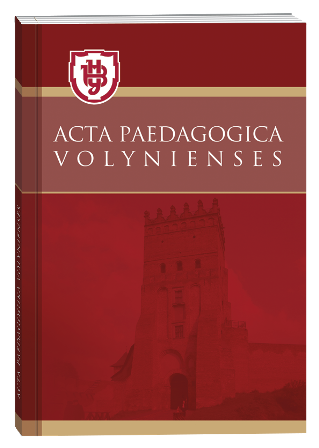FEATURES OF IMPLEMENTATION OF CERTAIN DISTANCE LEARNING TECHNOLOGY IN COLLEGE EDUCATIONAL PROCESS
DOI:
https://doi.org/10.32782/apv/2022.1.2.23Keywords:
distance learning technology, digital learning, cloud technology, gaming technology, flipped classroom, interactive learningAbstract
The theme of introducing certain distance learning technologies in the educational process, their impact on the learning outcomes of future educators is very important due to the need to find more modern forms and methods of work to improve the training in professional higher education. Therefore, it is very important to understand what is happening in education and what awaits with the introduction of modern educational technologies and which of them have the greatest impact on the distance learning quality. The purpose of the study is to carry out a theoretical analysis of the theme and on this basis to reveal the potential and capabilities of certain distance technologies in the educational process of the college, in particular, in the learning of a foreign language. The article analyses the main trends of distance learning. Emphasis is placed on the huge potential of distance learning technology and the feasibility of using the most effective of them, namely those that provide interactive collaboration between teachers and students and promote lifelong learning. The advantages of distance learning include a number of researched and used in practice technology that contribute to the personalization of learning, and within which students have the opportunity to choose, master additional competencies, and increase motivation for self-study. The use of flipped classroom, a form of blended learning that combines "synchronous" learning with "asynchronous" learning is described. The use of cloud and game technologies in the process of learning a foreign language is substantiated. The introduction of distance learning technologies in the process of learning a foreign language contributes to a more effective solution of the main tasks of mastering foreign language communicative competence and requires additional research, which will be reviewed according to the requirements of the time.
References
Аналітична записка підготовлена у рамках проєкту «Європейський Союз для сталості громадянського суспільства в Україні». ІСАР Єднання за фінансової підтримки Європейського Союзу, 2021. URL: https:// cedos.org.ua/researches/osvita-v-umovah-pandemiyi-analiz-problem-i-naslidkiv/ (дата звернення 05.01.2022).
Васильченко Л.В., Лапшина І.С. Організаційно-методичне забезпечення дистанційного навчання в закладах освіти. Харків : Вид. група «Основа», 2016. 128 с. (Бібліотека журналу «Управління школою». Вип. 01 (157).
Васильченко Л.В., Шацька Н.М. Досвід реалізації дистанційного навчання в умовах пандемії. Open educational e-environment of modern University. 2021. № 10 С. 43-55. URL: https://doi.org/10.28925/2414-0325.2021.105 (дата звернення 05.01.2022).
Державний стандарт початкової освіти: Постанова Кабінету Міністрів України від 21 лютого 2018 № 87, в редакції від 06.10.2020. URL: https://zakon.rada.gov.ua/laws/show/87-2018-%D0%BF#Text, (дата звернення: 20.12.2021).
Інформаційно-аналітична довідка про результати опитування щодо стану використання технологій дистанційного навчання у закладах вищої освіти України: Державна служба якості освіти України, 2021. URL: https://sqe.gov.ua/wp-content/uploads/2021/05/ANALITICHNA_DOVIDKA_Opituvannya_FPO_ZVO_DSYAO_05.2021.pdf (дата звернення 05.01.2022).
Кухаренко В.М., Бондаренко В.В. Екстрене дистанційне навчання в Україні: монографія. Харків : Вид-во КП «Міська друкарня», 2020. 409 с.
Лист МОН України від 22.09.2021 № 1/9-482 «Щодо методичних рекомендацій про викладання навчальних предметів у закладах загальної середньої освіти у 2021/2022 навчальному році. URL: https://mon.gov.ua/ua/npa?
params=&type=npa&key=&from=22.09.2021&to=&num=&category=&tag С. 58-71. (дата звернення: 20.12.2021).
Лотоцька А., Пасічник О. Організація дистанційного навчання в школі: методичні рекомендації. (2020). URL: https://mon.gov.ua/storage/app/media/ zagalna%20serednya/metodichni%20recomendazii/2020/metodichni%20recomendaziidustanciyna%20osvita-2020.pdf (дата звернення 05.01.2022).
Організація освітнього процесу в школах України в умовах карантину: аналітична записка. Л. Гриневич та ін. Київ: Київський університет імені Бориса Грінченка, 2020. 76 с.
Arnett, Thomas. Blended learning best practices during the pandemic. October 14, 2021. URL: https://www.christenseninstitute.org/podcast/blended-learning-best-practices-during-the-pandemic/ (дата звернення 05.01.2022).
Fisher, Julia Freeland. 5 education innovation trends worth watching in 2022. Jan 6, 2022. URL: https://www.christenseninstitute.org/blog/5-education-innovation-trends-worth-watching-in-2022/ (дата звернення 08.01.2022).
Peachey, Nik. Managing online learning, 2021. URL: www.oup.com/elt/expert (дата останнього звернення 05.01.2022).
Peachey, Nik. The Flipped Classroom for English Language Teaching. URL: www.oup.com/elt/expert (дата звернення 05.01.2022).







